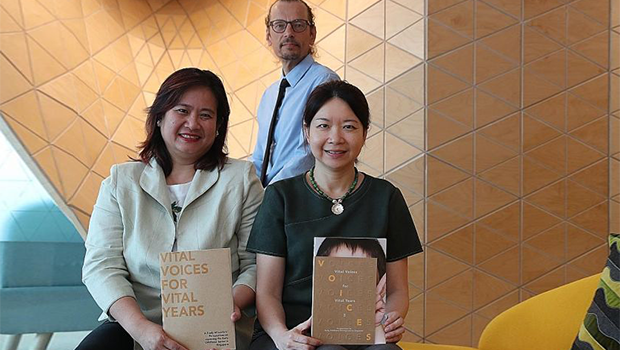
The study was led by (from left) Professor Lynn Ang, Professor Lasse Lipponen and Associate Professor Sirene Lim.ST PHOTO: TIMOTHY DAVID
Equip early childhood educators better to help kids with learning needs, say experts
More than 5,500 children aged six and below were diagnosed with developmental problems last year, up from an average of 4,362 new cases each year from 2015 to 2017.
In the wake of these rising figures from the Child Development Programme at KK Women's and Children's Hospital and National University Hospital, a group of 35 early childhood leaders have called for more to be done to help these children at the margins, as well as those from low-income families.
In a report released by the philanthropic group Lien Foundation yesterday, the experts, who cut across education, health and the social services, acknowledged that the Government has played a more active role in the sector.
But they said early childhood development is more than just how a child fares in school, and the walls between pre-schools and fields like health, social service and early intervention should be broken down.
The report, which is available online, comes seven years after the Lien Foundation's first study of the pre-school sector, where the group called for the Government to be in charge of pre-school.
The latest study was led by principal investigator Lasse Lipponen, professor of education from the University of Helsinki; and co-principal investigators Lynn Ang, professor of early childhood from University College London, and Sirene Lim, academic lead for the Early Childhood Education Programme at the Singapore University of Social Sciences.
The interviews were conducted between April and September last year, and the report was completed in March this year.
The three academics said early childhood educators need to be better equipped to support children who do not seem to fit in, whether because of developmental needs or complex home backgrounds.
They added that career pathways of pre-school teachers and early intervention professionals should be reviewed, so that both groups of practitioners can better work together to meet a child's holistic needs.
Support from different providers - pre-schools, voluntary welfare organisations and primary schools - should be more seamless for families so that they do not need to shuttle between venues, and the children can better ease into the primary school years.
At a press conference yesterday, Associate Professor Lim said canvassing the views of the 35 key leaders is seminal, given that practitioners in early childhood and early intervention had not worked together here in a significant way.
"(For) most teachers who work in regular early childhood set-ups or mainstream primary schools, the mindset has been: 'I'm going to teach to the average child, and everybody is about the same'," she said.
"It's very common to have significant variations in the first six years of a child's development because it all depends on a child's exposure, the child's home background."
Their recommendations come even as the Ministry of Social and Family Development (MSF) announced last month that it would be setting up a workgroup to look at how to better integrate children with learning needs into pre-schools.
It had also said that from July, early intervention programmes will be transferred from MSF's Disability Office to the Early Childhood Development Agency in stages, for the agency to have better oversight of developmental needs of all children under the age of seven.
Mr Darren Lew knocked on the doors of nearly 10 pre-schools before finding Kindle Garden, the first inclusive pre-school here, for the older of his two girls, who has Down syndrome. The girl is now eight.
"Most of the schools turned us down, (saying) that their teachers were not well trained to handle children with special needs," said the 42-year-old engineer.
Centralising help for parents of children with special needs would be helpful, he said.
"Help is there, it's everywhere. We just have to look for it. If there's someone who can give more advice, or a place where things are more centralised and not so fragmented, that would be good."
Early Childhood Development Agency on the Lien Foundation report:"We will continue to step up our efforts in strengthening the ecosystem of support for children with developmental needs. We seek to provide more customised and affordable early intervention (EI) services, moving away from the one-size-fits-all model of service delivery within EI centres and strengthening the support within pre-schools. "For example, two new programmes will be introduced from July 1: Early Intervention Programme for Infants and Children (Eipic) Under-2s, where parents/caregivers accompanying their children under two years old will receive training to carry out intervention strategies in the child's daily routines at home; and the Development Support Plus programme to support children with mild to moderate developmental needs transit from Eipic to receiving intervention within pre-schools. "We agree that our educators are the heart of quality EC (early childhood) services and have invested in various measures to further develop their competencies and uplift the EC profession. |













 Get it on Google Play
Get it on Google Play